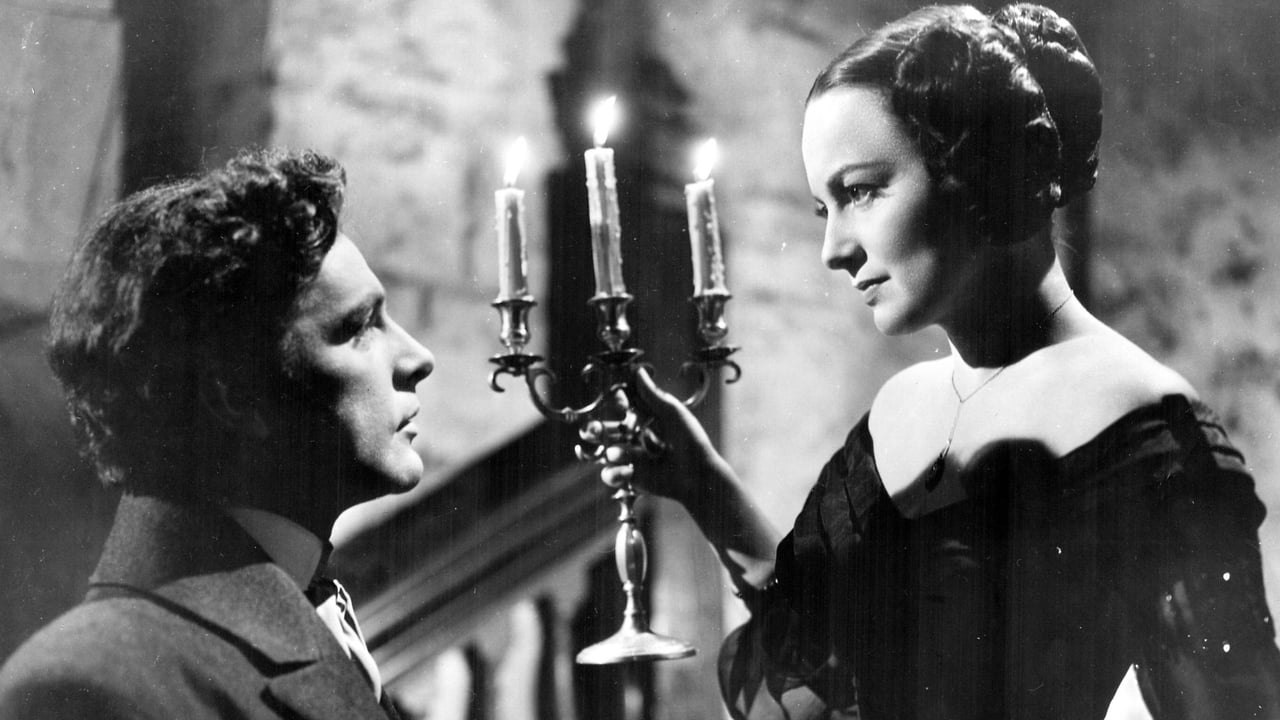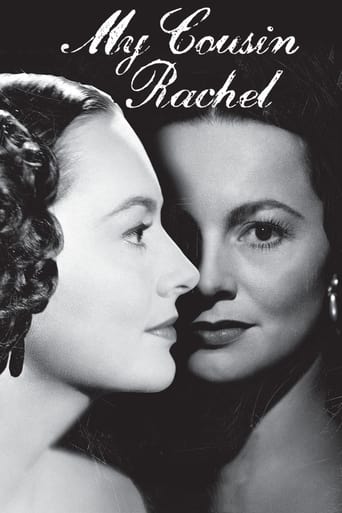

not as good as all the hype
... View MoreAt first rather annoying in its heavy emphasis on reenactments, this movie ultimately proves fascinating, simply because the complicated, highly dramatic tale it tells still almost defies belief.
... View MoreI enjoyed watching this film and would recommend other to give it a try , (as I am) but this movie, although enjoyable to watch due to the better than average acting fails to add anything new to its storyline that is all too familiar to these types of movies.
... View MoreWhile it is a pity that the story wasn't told with more visual finesse, this is trivial compared to our real-world problems. It takes a good movie to put that into perspective.
... View MorePhilip Ashley (Richard Burton) is a brash young man in this Gothic tale. When Cousin Ambrose writes to him that his wife is slowly killing him, he accepts it without question...even though it's very possible Ambrose was not in his right mind. After all, his father died of a brain tumor...perhaps this is causing Ambrose to compose these weird letters. Regardless, Philip is pre-disposed to hate Ambrose's wife, Rachel (Olivia de Havilland). Philip rushes to Italy to see his cousin but the man was dead and buried by the time he arrived. His widow was not there and Philip immediately leaves to return to his estate.Out of the blue, Rachel arrives at Philip's estate soon after this. Inexplicably, he almost immediately likes her and just assumes the letters were the ramblings of a madman. While this could be true, Philip's change of heart betray him as a very immature sort of young man. And, when he falls for Rachel and wishes to marry her, you wonder....is this a marriage made in Heaven or a prelude to his soon descent into Hell? Regardless, it soon becomes apparent that Philip has some serious issues!When Ben Mankiewiecz introduced this film, he indicated that many thought Richard Burton was miscast as Philip because he was too old...though he was only 26. He just happened to look older and the part called for a young many about to turn 25. Burton's performance earned him an Oscar nomination--oddly, for Best Supporting Actor even though he was in every scene and clearly was the star. His performance is full of power and intensity...perhaps too much at times for my taste. This movie is in many ways very reminiscent of the earlier film "Suspicion" which, interestingly, starred de Havilland's sister (Joan Fontaine). It keeps you guessing as to Rachel and her innocence...as well as Philip's sanity. Well made and interesting.
... View MoreHeadstrong Philip Ashley, an orphan raised by his uncle following the death of his parents, suspects foul play when his guardian dies abroad after smuggling out letters accusing his new wife (Olivia De Havilland) of trying to kill him. However, when she visits England he finds himself drawn to her despite himself and convinces himself that his uncle died as the result of a brain tumour that made him irrationally suspicious of those he loved. Despite this, evidence to suggest she might indeed be guilty leaves him with fresh doubts.Nunnally Johnson's adaptation of Daphne Du Maurier's murder mystery does a fine job of continuously wrong-footing the viewer so that we, like Philip, can never quite decide whether the outwardly elegant and refined widow Ashley is actually a cold-blooded killer. This uncertainty compels us to keep watching as the plot's twists manipulates us into believing first one thing then the other, making for a compelling and enjoyable mystery. Unfortunately, the deliberately ambiguous ending means we are still none the wiser as to whether 'shedunnit' or not when the final credits roll.27-year-old Richard Burton cuts an imposing, Heathcliff-like figure as Philip, the brash, impulsive heir to his uncle's fortune. He was always more effective as stern, authoritarian figures, and although he gives an impressive performance that largely carries the film, at times he struggles to inject the required touch of sensitivity in its more tender moments. It has to be said that events on screen are depicted with as much ambiguity as the mystery itself, with the viewer left to surmise that Philip and the widow have indeed engaged in a sexual liaison when the film coyly moves on to the next scene. Such subtlety, to varying degrees, is also evident in the clues regarding Rachel's possible guilt (or innocence) that are provided.It's a shame that Du Maurier failed to come up with a definitive conclusion to what, until its finale, is a truly absorbing drama, but in retrospect it's apparent that to have done so would have probably required too many additional twists and revelations to make anything she came up with plausible.
... View MoreRichard Burton is simply outstanding in his role as Phillip. I am also impressed with how well Nicholas served as his godfather. Rachel is so well mannered and polished it made it difficult to read her true intentions. I loved John Sutton in his very brief role as Ambrose. The director and musical score was well done. Elizabeth was a true and dear friend to the end. Youth is not the best quality in making sound emotional decisions. Phillip is such a strong character. Rachel is quite his match when it comes to getting what she really wanted. The ending leaves one to question everyones true motives regarding money and love.
... View MoreIt isn't surprising that this movie plays like Rebecca Lite since both were based on novels by Daphne Du Maurier, and both are about a spouse with mysterious intents who may or may not be a murderer. The comparison is unfortunate since not only is Rebecca the better story, Alfred Hitchcock was also a more brilliant director than Henry Koster, even if the latter had the aid of Joseph LaShelle, the cinematographer who did amazing work with shading in Laura. LaShelle does good work here too, though it's not as indelible as with Laura.It is amusing to compare Olivia de Havilland here with the lead actress of Rebecca, Joan Fontaine, since both are sisters who had a very public rivalry going. Fontaine's definitely better, but only because, again, Rebecca is the better movie. I thought de Havilland out-acted any performance of her sister's with The Heiress. Similarly, Richard Burton here pales in comparison to Laurence Olivier in Rebecca, though it is still interesting to watch Burton in this, his breakout role, and see how his strong personality was already evident even then.
... View More